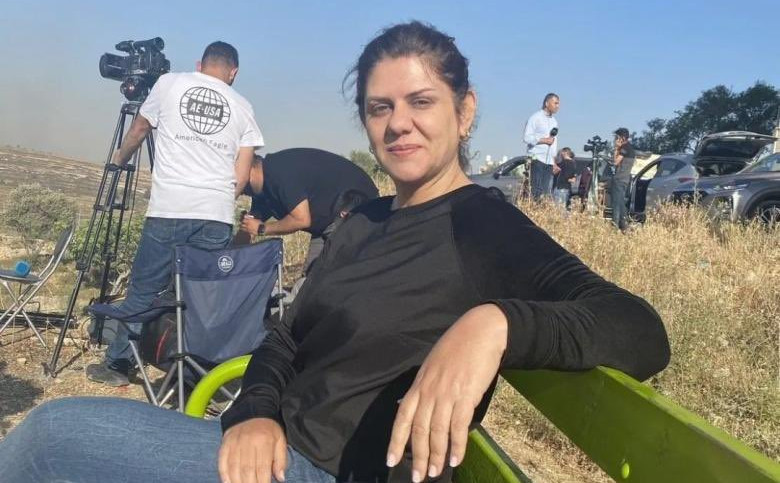Qatar had strongly condemned the killing of the veteran journalist and the horrifying crackdowns on her funeral.
A United States statement on its examination of the bullet used by an Israeli sniper to kill journalist Shireen Abu Akleh is “cold comfort”,” said the Palestinian-American journalist’s family on Monday.
“The notion that the American investigators, whose identity is not disclosed in the statement, believe the bullet ‘likely came from Israeli positions’ is cold comfort,” said the bereaved family of Abu Akleh, in a statement shared by her niece Lina Abu Akleh.
Washington received the bullet on Saturday for examination as part of an investigation into the killing of the journalist, who was shot and killed by an Israeli sniper on 11 May, as per UN findings.
However, the US State Department said on Monday that it could not reach a conclusion in its investigation due to the ammunition being “badly damaged”.
The probe found the bullet had come from “positions” belonging to Israeli soldiers, with the United States downplaying the killing as “the result of tragic circumstances” during an Israeli raid “against factions of Palestinian Islamic Jihad”.
Responding to Washington, the family of Abu Akleh said:“We are incredulous”.
The Palestinian Authority (PA) meanwhile said it “will not allow attempts to conceal the truth or to have shy references in pointing the finger of accusation to Israel.”
“The occupation government bears responsibility for the assassination of Shireen Abu Akleh, and we will continue our procedures at the international courts,” said Hussein al-Sheikh, Secretary-General of the Executive Committee of the Palestine Liberation Organization (PLO).
The Palestinian Public Prosecution also stressed that the killing was intentional, in a statement published by Palestine’s news agency (WAFA).
“It is unacceptable what was stated by the American side that there were no reasons indicating that the targeting was intentional, especially since they were aware of the overall investigations of the Public Prosecution that confirmed the issue of a premeditated killing,” it said.
Global outrage
The lack of a thorough investigation into the killing has sparked outrage globally, with many taking aim at the US’ refusal to hold the occupying state to account.
Senior Al Jazeera Arabic anchor Ghada Oueiss took to Twitter to comment on the findings of the murder of her colleague, saying, “The US is telling its child Israel: ‘kill journalists as much as you want, big lady, we’re covering you’.”
The sniper, who admitted to the crime, had deliberately targeted a precise area in Abu Akleh’s head that was not covered by the helmet, completely shattering her skull, per testimonies by her life-long colleague Givara Budeiri.
Commenting on the US’ claims that the killing was unintentional, Omar Shakir, Israel and Palestine Director at Human Rights Watch (HRW), said that the “focus on intentionality is a deliberate misdirect.”
“Israel routinely uses excessive force—their pattern of indiscriminate fire regularly kills and maims Palestinians, including journalists. No-one questions the intent of a perennially drunk driver who kills—they punish them severely,” tweeted Shakir.
Meanwhile, Israeli human rights group B’Tselem slammed Washington’s statement as “US-backed Israeli whitewash”.
“All investigations published so far conclude that Israel is responsible for the killing of journalist Shireen Abu Akleh[…]as far as Israel is concerned, its policy regarding the killing of Palestinians has never been anything other than an organised whitewash,” it said.
Echoing the statements of activists worldwide, Amnesty International secretary general Agnes Callamard said the US focused more on the wording of its statement rather than the investigation itself.
“I suspect it took the key parties more time to reach agreement over the wording of the statement than actually investigate the killing. Intention matters but its possible absence does not absolve Israel of its responsibilities,” tweeted Callamard.
In addition to the US’ failure to hold Israel to account, many pointed out what appeared to be contradictory remarks in the statement itself.
“If the State Department does indeed believe that the Israeli killed Shireen Abu Akleh, then how is it so sure it wasn’t intentional? She and her colleagues were clearly labeled press and wearing protective gear,” said Abdallah Fayyad, opinion writer at the Boston Globe.
The latest development in the case of Abu Akleh comes following various investigations by rights groups, news outlets, and testimonies of witnesses.
Last month the UN found the bullet had been fired from an Israeli sniper.
US media outlets have also conducted various investigations, amplifying the testimonies of the witnesses on site, with the most recent probes conducted by The New York Times and the Washington Post.
Despite the evidence, there has been a lack of accountability with the Israeli regime for killing the journalist, as well as its mass crackdown on mourners that followed, in particular during her mass funeral. One of the pallbearers carrying Abu Akleh’s coffin was later detained and questioned by the Zionist state.
Tel Aviv media outlet, Haaretz, reported in May that Israel will not be conducting a criminal probe into the funeral attacks.
Qatar had strongly condemned the killing of Abu Akleh and the horrifying crackdowns on her funeral.
Addressing the World Economic Forum (WEF) in Davos in May, Qatar’s Amir Sheikh Tamim bin Hamad Al Thani said that Israel denied Abu Akleh a dignified burial.
“[The] Palestinian-American journalist was killed two weeks ago in Palestine, and then robbed, of a dignified-burial. Shireen was covering the suffering, of the Palestinian people for decades, and our hearts, are broken,” said the amir.







